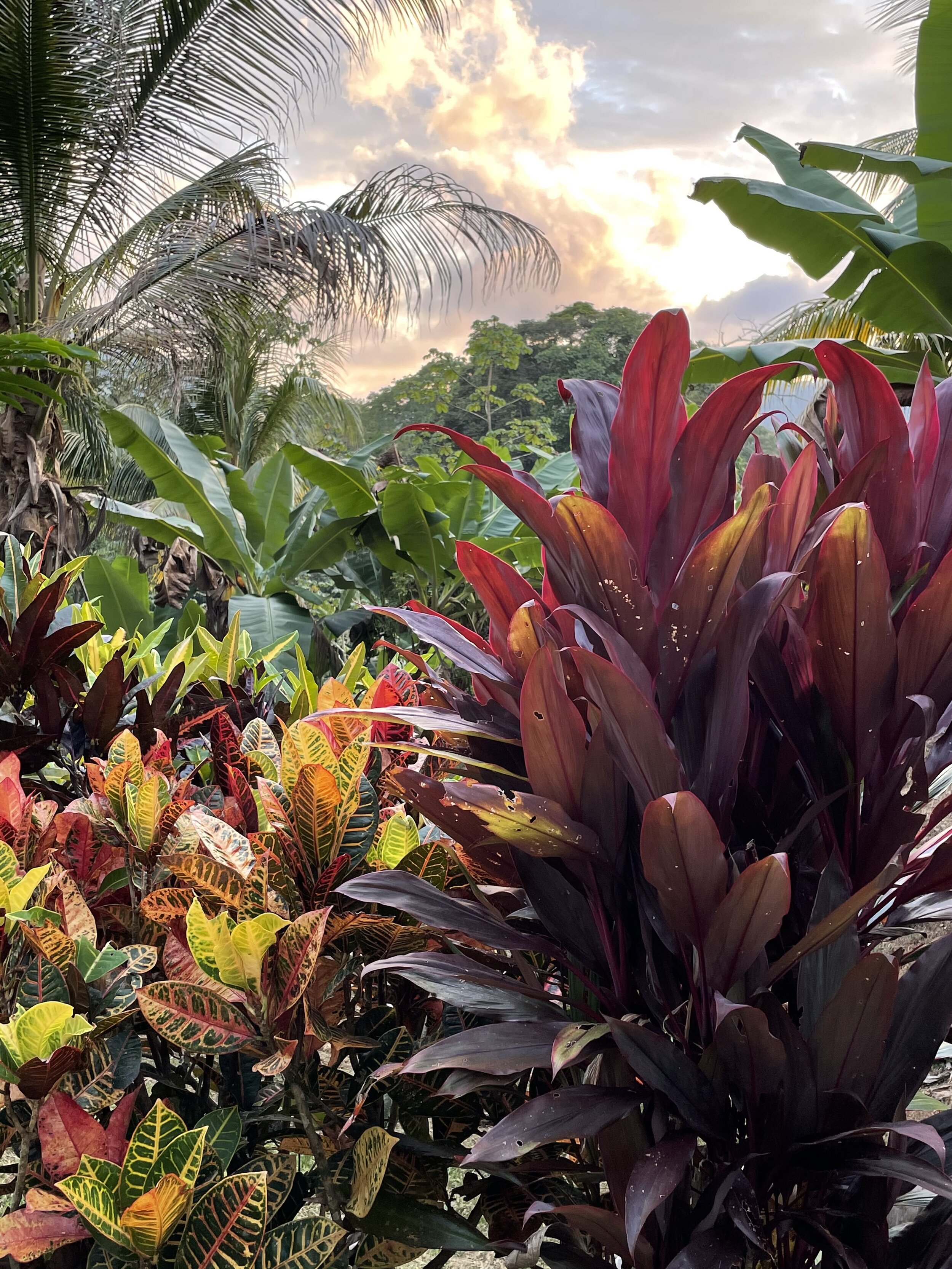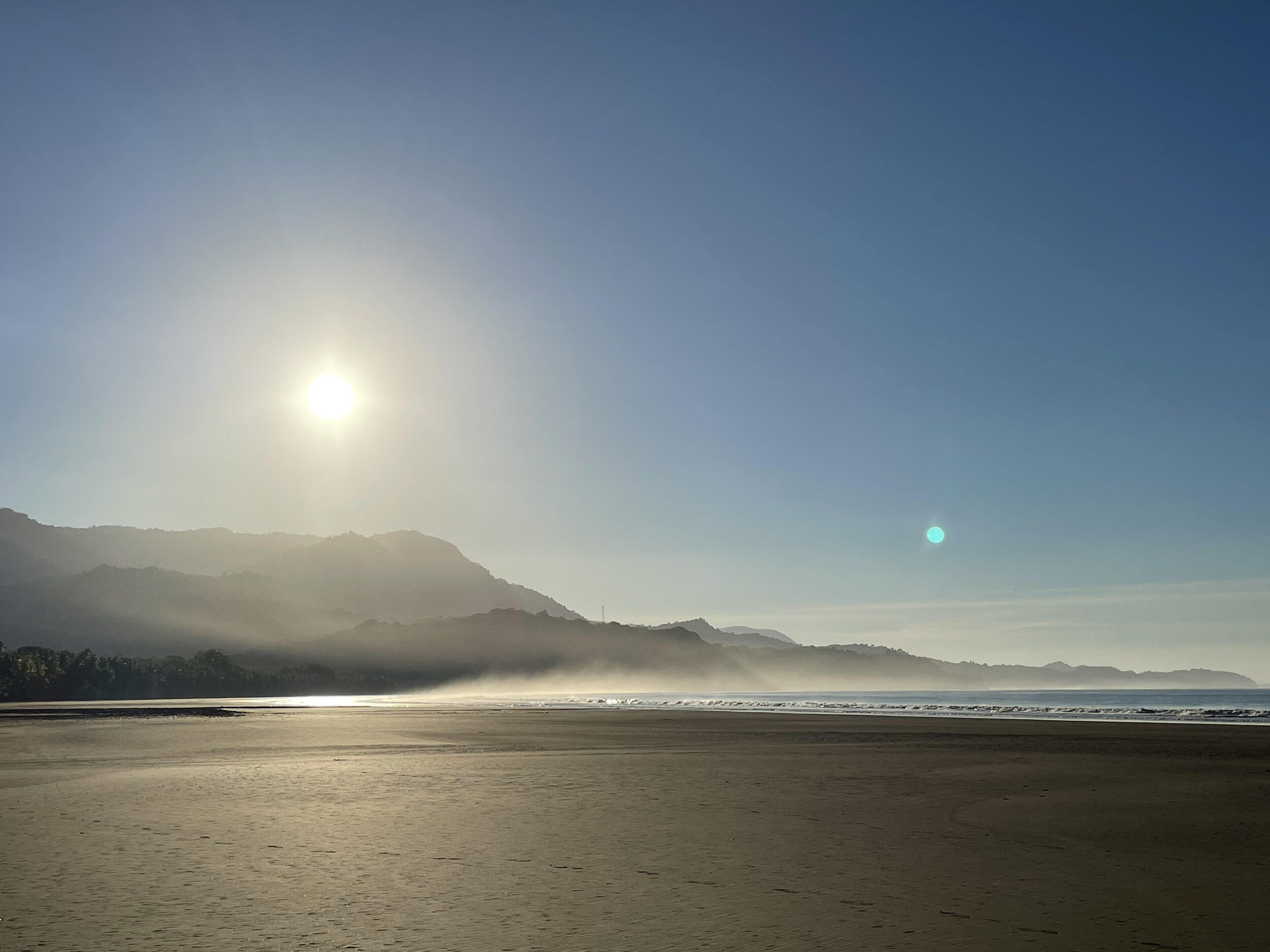First, know that God, the word God, is shorthand for Everything. Everything, Everywhere, with one exception: our mean little thoughts that insist that we are separate from this Everything that is God. It’s the ego, that bad-day voice that tells us that we’re victims or losers or jerks, and the only thing that is not God.
Because God is Everywhere, there is no reason to go anyplace. Yet, I left anyway. Pandemic be damned, I wanted to go to the tropics. Even if Everything that is God also includes snow and ice, and therefore more snow and more ice must mean more God, as it all piled up, I found it harder to find God—or anything else—so I fled to the land of flowers.
Second, know that I have an agenda. I have been writing the story of my life, how I went from hating myself to finding God in the snow and in the flowers and in the streets and in the pain and in the blessings. I’m hardly perfect in this finding, which is why I’m writing a story and not a sermon. The pandemic, through its gift of time, has helped me tell this story. But the story has become a mass of tangled vines. Because when you write of your life, you can write about everything, and when you write about God, you can write about Everything. Everything times two is a jungle of words and themes and passions and images. So I went to where they know how to use a machete.
My manuscript, plus sparkling water.
I masked up, got on a plane with no passengers, and landed at my friends’ beautiful home in the jungle, where even an atheist could see God popping out everywhere: in each palm frond and fresh banana, in every exquisite flower and butterfly and bird whose unreal colors appeared to be painted on. I found the sound of the cicadas to be the most godlike of all. Their high-pitched buzzing rattle pulsed through the hot green landscape, penetrating the mind and blurring the boundaries between self and other. The lesson of the cicadas: what is out there is also in here—nothing is separate from Everything.
I did not let this paradise distract me from my agenda. In between dips in the river and photo forays in the garden, I worked on my manuscript. The afternoons were hot, so I sat between two fans and drank iced water as I typed on my laptop. When my friends went to the beach, I stayed home with my machete. I did join them on a trip to the farmers’ market, where I bought a bag of my favorite food: eight large avocados for under $5. I didn’t realize that I’d left the bag in the bathroom until we’d driven the half-hour back home.
Mourning my abandoned fruits, I went back to work. Suddenly, the screen of my machine stopped showing words and scrambled itself like an old-time television. My story was now a flashing mass of horizontal lines. My heart stopped.
This was the moment when my years of practicing revealed themselves. Despite my mounting panic, I found a small clear space. I calmly shut off the machine and prayed. After a few minutes, got my normal screen back. Now the grief of lost fruits was entirely replaced by joy. I needed the threat of losing something huge to release the loss of something small.
Two days later, when I turned on the same machine to teach my remote yoga class—to give others an experience of Everything—the horizontal lines came back. Again, I shut off the machine, but felt less calm. Indeed, this time when I turned it back on, there was no joy.
When things do not go as you wish, trouble starts; and that is the true time of test, that is the time for your practice. (187)
My practice. That morning, my practice meant not giving up. My friends lent me one of their machines for the class, then helped me research ways to fix the situation, enlisting several of their friends and tech support people. They also found me a monitor to hook up to my ailing machine (in case it was just a screen issue), and let me use their machines for a full week while we waited for their friends to come back from the far-off city with the connector part I needed to hook my machine to the monitor. (Having the part delivered in two days would not happen. The closer one gets to the real Amazon, the farther one is from the American Amazon.). Third, know that when I say “God,” this very much includes the generosity of other people.
Until my broken machine could be recovered, my story—all 247,000 words of it—was lost to me. Because I used a specialized author’s software, I hadn’t saved any of it to the cloud, and my backups were back up in the land of snow and ice. Until the part came, all I could do was be in Everything—for starters, I went to the beach. I got a massage. We hiked up rivers to hidden waterfalls. I drew plants in a sketchbook.
I took the time to be with butterflies.
I also read Osho, an Indian philosopher guru who always shows up when I need him most:
Desires are the chains that hold you. Each desire forms a fresh link in the chain…the more desire, the stronger become the shackles that bind you and the thicker become your prison walls. (157)
No bullshit—I knew Osho was on to me. My desire to machete up my manuscript so I could transform it into something I could share, or even publish, was a major shackle. I’ve invested almost 10 years of my life in this project, with its fits and starts, and my desire bound me up tight. I knew this because when the connector part finally arrived and we hooked it up and discovered that the once-working monitor was now dead, I kept pushing forward. I would accept a neighbor’s offer to buy an monitor that I could borrow. He told me the store and gave me the specs he wanted. At the store, there were no monitors. They could order one for me, but it would take too long to arrive.
You will experience these moments in your own life when all your faith will be shaken and your mind will cry out, “What is happening?” (181)
Except I knew what was happening—I was being tested by the Everything. Could I give up my desire to machete my manuscript on this vacation?
Yes. Yes, I could. But I could only do that by replacing that desire with other ones—fresh links in the chain. Now I had a rental car and could explore sites for future yoga retreats. I could visit other beaches. I could go to the mountains. I could completely ignore Osho’s words (“To abandon all thoughts of destination is the destination itself.” (193) and go on a bender of desire.
I was told that I had to see Playa Ballena at low tide when the sand bar is revealed in the shape of a whale’s tail. The next day, low tide would be at 5:30 am, so I got up with the howler monkeys and left before 6. I drove to the beach, a national park, but the gate was closed. If I was really listening to Osho, I would have accepted this and left:
From the very beginning you should not make any effort to change your circumstances, but leave everything in {God’s} hands. (188)
But then I saw a man leaving the park by crawling through a gap in the barbed-wire fence.
Also know this about me: if I can sneak in, I will. I approached the gap, but when the man saw me, he said I wasn’t allowed inside. (At least, this is what I assume; my Spanish comprehension is never good, and definitely not at 6:20 in the morning.). So I waited for him to leave and then slipped through the fence. The thrill of breaking a rule, combined with the beauty of the early-morning beach where a gentle sun warmed the sea mist, got me high.
This plus adrenalin would get you high, too.
High enough that as I walked along the shoreline towards the tail, which I could see in the distance, and heard a man whistling at me, I decided to ignore him. Like he would just forget about me, the only other person on the beach! A hefty guy wearing only swim trunks, he shouted and waved as he ran towards me. Realizing there was nowhere for me to go, I stopped for him and hoped that he wouldn’t have a heart attack. When he got to me and finally caught his breath, he said that the beach was closed and that if the police found me, it could be trouble. I could keep walking if I wanted to, but he wanted to warn me. (Or something like that—again, Spanish.) He then plunged into the water where he inexplicably filled his plastic bottle with seawater. I too wanted to swim, but was loathe to leave my backpack on the sand with a strange man around. When he came back on shore, his tone had changed: I was to leave, now. He told me his first and last name, maybe suggesting that he worked there, and said I could get “arrestado.” The word was clear enough, even to me, but he also demonstrated it by holding his arms behind his back, wrists shackled. Regardless of whether he was full of shit, having him there was a buzzkill, so I gave up my desire to walk the tail and went back to my car.
My desire for early-morning ocean was not to be ignored. The town beach was nearby, so I parked again and walked to the water. This time, a uniformed man told me that this too was part of the national park, which was indeed closed on Tuesdays. He suggested another beach that was open, and so I continued on my new quest, my body craving the feel of salt water on skin. I drove down the coast and found the turn onto a steep gravel road going down. At the bottom, a stream appeared to be running through the road. My rental does not have 4-wheel drive, and not desiring to get it stuck, I turned around, made it up the hill and parked on the side of the road. I decided to leave the car and walk, but I felt nervous about this. Although there weren’t any “no parking” signs, I’d heard about people losing their license plates when parked in the wrong place. La policia will come by and just take the plates without warning. However, I didn’t want to attempt driving through a stream in my rental, nor did I want to give up and just go home. So I imagined protective light around the car and walked to the beach.
After a ten-minute walk, I got to the entrance. This time, I was greeted by three teenagers staring at their phones, presumably there to charge people to park. “Buenas dias!” I said.
“Buenas!” the kids called back, faces down. I walked right in, and God was waiting.
When you chase desire, new ones come fast. I wanted to go into the water, but I didn’t want my phone stolen. I put my phone with my belongings up on a rock at the water’s edge. At first, it was a relief to be in the water. But I kept glancing at the pile of my stuff and hoped it wouldn’t get washed out to sea. And I kept wondering if I would still have plates when I got back to my car.
Then I thought of Osho’s ideal of the devotee:
The perfect devotee has no complaints; his confidence in Him is complete: whatever You will is best for me… (182).
Did being the perfect devotee mean that broken computers, stolen phones, missing plates were all to be accepted gratefully? To understand these headaches as lessons, or simply as the inexplicable whim of God’s will? My practice, as I walked out of the surf salty and wet, was to imagine myself finding my rental car was plateless—or towed—and accepting that as part of Everything. I laughed out loud. Having heard so much Spanish already that morning, a Spanish phrase echoed in my mind: no importa nada. It doesn’t matter.
As I left the beach, satisfied with my morning plunge and curious about the state of the car, I mused as to what I would do if the car were gone. My best plan, as the perfect devotee, would be to put on more sunscreen and start walking.
Fortunately, I didn’t have to prove myself that morning. The car sat where I left it, plates on, protective light in place.
The status of my other machine, however, remains a mystery. I won’t know until I get back to the snow and ice if the information on my computer can be saved or if the backups really worked. Lastly, know this: I am not a perfect devotee. I want my story back regardless of what God wants. I realize that writing my story can be an egoic undertaking that separates me from Everything—if I think of myself as someone special with a special story. But if my story helps others find God, the Divine Sparkle in Everything, then it’s good work. Besides, people need something to read on the beach.
And now I see an opening. A tiny, dust-sized opening in my desire that allows me to maybe remotely imagine myself giving up my story, freeing myself from the task, if that’s what the Everything wants.
Leave all to him. The only grip you have to loosen is the grip on yourself, and everything is solved. (203)
In the meantime, I found my machete. Taking a break from staring at the vines on my screen got me clearer on what my story is to be. Everything, I am ready.
Fresh coconut, anyone?
Quotations are from The True Name, Osho’s commentary on Japji, the Song of the Soul. Full Circle Publishers, 1974.






